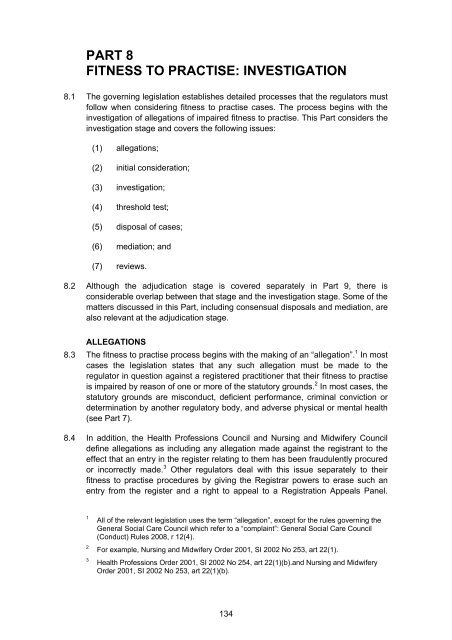Regulation of Health and Social Care Professionals Consultation
Regulation of Health and Social Care Professionals Consultation
Regulation of Health and Social Care Professionals Consultation
Create successful ePaper yourself
Turn your PDF publications into a flip-book with our unique Google optimized e-Paper software.
PART 8<br />
FITNESS TO PRACTISE: INVESTIGATION<br />
8.1 The governing legislation establishes detailed processes that the regulators must<br />
follow when considering fitness to practise cases. The process begins with the<br />
investigation <strong>of</strong> allegations <strong>of</strong> impaired fitness to practise. This Part considers the<br />
investigation stage <strong>and</strong> covers the following issues:<br />
(1) allegations;<br />
(2) initial consideration;<br />
(3) investigation;<br />
(4) threshold test;<br />
(5) disposal <strong>of</strong> cases;<br />
(6) mediation; <strong>and</strong><br />
(7) reviews.<br />
8.2 Although the adjudication stage is covered separately in Part 9, there is<br />
considerable overlap between that stage <strong>and</strong> the investigation stage. Some <strong>of</strong> the<br />
matters discussed in this Part, including consensual disposals <strong>and</strong> mediation, are<br />
also relevant at the adjudication stage.<br />
ALLEGATIONS<br />
8.3 The fitness to practise process begins with the making <strong>of</strong> an “allegation”. 1 In most<br />
cases the legislation states that any such allegation must be made to the<br />
regulator in question against a registered practitioner that their fitness to practise<br />
is impaired by reason <strong>of</strong> one or more <strong>of</strong> the statutory grounds. 2 In most cases, the<br />
statutory grounds are misconduct, deficient performance, criminal conviction or<br />
determination by another regulatory body, <strong>and</strong> adverse physical or mental health<br />
(see Part 7).<br />
8.4 In addition, the <strong>Health</strong> Pr<strong>of</strong>essions Council <strong>and</strong> Nursing <strong>and</strong> Midwifery Council<br />
define allegations as including any allegation made against the registrant to the<br />
effect that an entry in the register relating to them has been fraudulently procured<br />
or incorrectly made. 3 Other regulators deal with this issue separately to their<br />
fitness to practise procedures by giving the Registrar powers to erase such an<br />
entry from the register <strong>and</strong> a right to appeal to a Registration Appeals Panel.<br />
1 All <strong>of</strong> the relevant legislation uses the term “allegation”, except for the rules governing the<br />
General <strong>Social</strong> <strong>Care</strong> Council which refer to a “complaint”: General <strong>Social</strong> <strong>Care</strong> Council<br />
(Conduct) Rules 2008, r 12(4).<br />
2 For example, Nursing <strong>and</strong> Midwifery Order 2001, SI 2002 No 253, art 22(1).<br />
3 <strong>Health</strong> Pr<strong>of</strong>essions Order 2001, SI 2002 No 254, art 22(1)(b).<strong>and</strong> Nursing <strong>and</strong> Midwifery<br />
Order 2001, SI 2002 No 253, art 22(1)(b).<br />
134
















